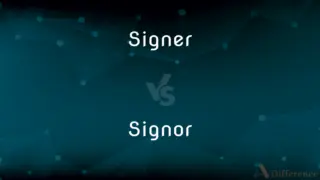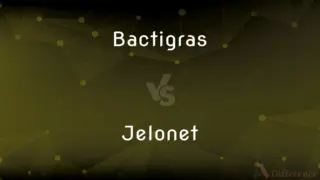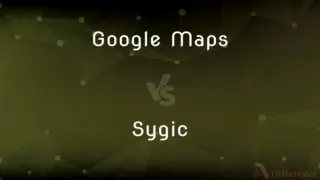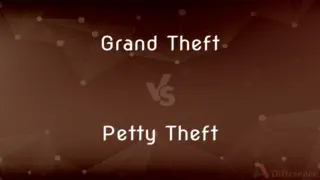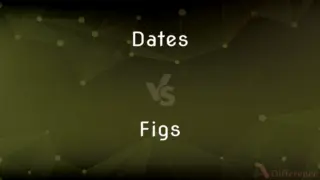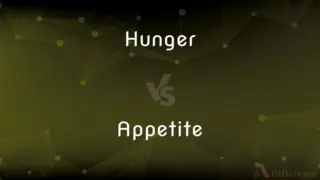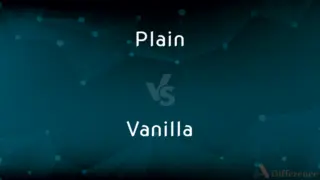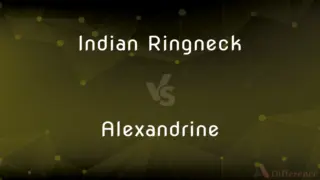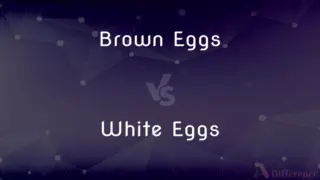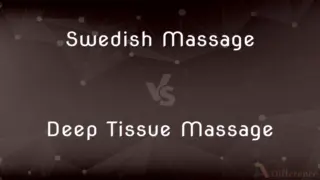Grandpa vs. Grampa — What's the Difference?
By Tayyaba Rehman — Updated on October 17, 2023
"Grandpa" and "Grampa" both mean grandfather; the difference lies only in spelling preference.

Difference Between Grandpa and Grampa
Table of Contents
ADVERTISEMENT
Key Differences
"Grandpa" is a commonly used term for one's grandfather, a familial term that is widely accepted and understood in English-speaking communities. "Grampa," on the other hand, is simply a less common variant spelling of "grandpa," often reflecting regional or individual pronunciation preferences. Both terms convey the same degree of warmth and familiarity, denoting a family's elder male figure, typically the father of one's parent.
From a phonetic perspective, "Grandpa" represents the standard pronunciation, aligning with the more formal "grandfather." "Grampa," while phonetically similar, often indicates a more colloquial or relaxed speech pattern, as dropping the "d" reflects a common casual vocal tendency. Despite this slight phonetic deviation, both "grandpa" and "grampa" are immediately recognizable and understood in context as affectionate terms for a family patriarch.
In written communication, "Grandpa" is more frequently seen, as it aligns with standard spelling conventions. "Grampa" appears less often in writing, primarily in dialogue or in informal contexts to reflect speech patterns. Both spellings, however, are considered correct and can be used interchangeably, depending on the writer's preference or the character's voice, if in fictional writing.
When considering etymology, "Grandpa" derives from the combination of "grand," indicating a generation apart, and the familiar "pa," a common informal term for father. "Grampa" follows the same etymological path, with a minor spelling variation to mimic specific dialects or colloquial speech. Both versions underscore the familial respect and affection accorded to paternal elders.
In cultural media, such as books, movies, and television shows, "Grandpa" is more prevalent because it's the standard spelling. "Grampa," while less common, is not unheard of, particularly in portrayals of familial dialogue or in characterizations where regional dialects are prominent. In either form, the term represents a figure who is typically wise, venerable, and cherished in the family dynamic.
ADVERTISEMENT
Comparison Chart
Common Usage
More commonly used.
Less commonly used.
Phonetic Representation
Represents standard pronunciation.
Reflects colloquial speech pattern.
Written Communication
More frequent in writing.
Less frequent, more informal.
Etymology
Standard etymological path.
Same origin, variant spelling.
Cultural Media
More prevalent in media.
Less common, used for dialect portrayal.
Compare with Definitions
Grandpa
A source of wisdom and tradition in a family.
Grandpa always gives the best advice during our family gatherings.
Grampa
A casual, affectionate term for a paternal elder.
Grampa's making us pancakes for breakfast.
Grandpa
A term of endearment for a grandfather.
I spent the weekend fishing with my grandpa.
Grampa
Another term for one's grandfather, father of one's parent.
I'm visiting my grampa this summer.
Grandpa
An informal term for one's male ancestor.
Grandpa showed me the family tree yesterday.
Grampa
A term used to denote heritage and lineage.
We're taking a trip to explore where grampa grew up.
Grandpa
A figure of respect and familiarity in extended families.
Everyone, from the kids to the adults, loves when grandpa visits.
Grampa
A familial term indicating respect and relationship.
Grampa told us tales of his time in the service.
Grandpa
A family's elder male, a father's or mother's father.
My grandpa has incredible stories about his youth.
Grampa
An elder male figure, often associated with wisdom.
Whenever I need guidance, I turn to my grampa.
Grandpa
One's grandfather.
Grampa
(informal) grandfather
Grandpa
(informal) grandfather
Grampa
A grandfather.
Grandpa
A grandfather.
Grandpa
A grandfather.
Grandpa
The father of your father or mother
Common Curiosities
How common is the spelling "Grampa"?
"Grampa" is less common, but it's an accepted variant.
In what context is "Grampa" used?
"Grampa" is often used in informal speech or to reflect regional dialects.
Is "Grandpa" formal or informal?
"Grandpa" is informal and used affectionately within families.
Is "Grampa" a modern term?
"Grampa" has been used for many years, though less commonly than "Grandpa."
What's the origin of "Grandpa"?
It's a contraction of "grand" from "grandfather" and "pa," an informal term for father.
How does "Grandpa" relate to family structure?
"Grandpa" denotes a familial relationship, specifically the father of one's parents.
Does "Grampa" have different meanings in various cultures?
The basic meaning stays the same, but cultural nuances can vary.
Can "Grandpa" be capitalized?
Yes, "Grandpa" is often capitalized when used as a proper noun.
Is "Grampa" a correct spelling?
Yes, "Grampa" is correct but represents a colloquial variant.
Can "Grampa" be used in formal writing?
"Grampa" is informal; its use in formal writing depends on context.
Is "Grandpa" used worldwide?
"Grandpa" is used in many English-speaking regions, with local variations.
Can "Grandpa" refer to a non-biological grandfather?
Yes, "Grandpa" can refer to step-grandfathers or honorary family elders.
Does "Grampa" sound more casual?
"Grampa" can sound more casual due to its phonetic closeness to relaxed speech.
Are "Grandpa" and "Grampa" interchangeable?
Yes, they're generally interchangeable in familial contexts.
What's the difference between "Grandpa" and "Grandad"?
Both are terms for a grandfather, but "Grandad" is more common in British English.
Share Your Discovery

Previous Comparison
Flakey vs. Flaky
Next Comparison
Imminent vs. PendingAuthor Spotlight
Written by
Tayyaba RehmanTayyaba Rehman is a distinguished writer, currently serving as a primary contributor to askdifference.com. As a researcher in semantics and etymology, Tayyaba's passion for the complexity of languages and their distinctions has found a perfect home on the platform. Tayyaba delves into the intricacies of language, distinguishing between commonly confused words and phrases, thereby providing clarity for readers worldwide.






